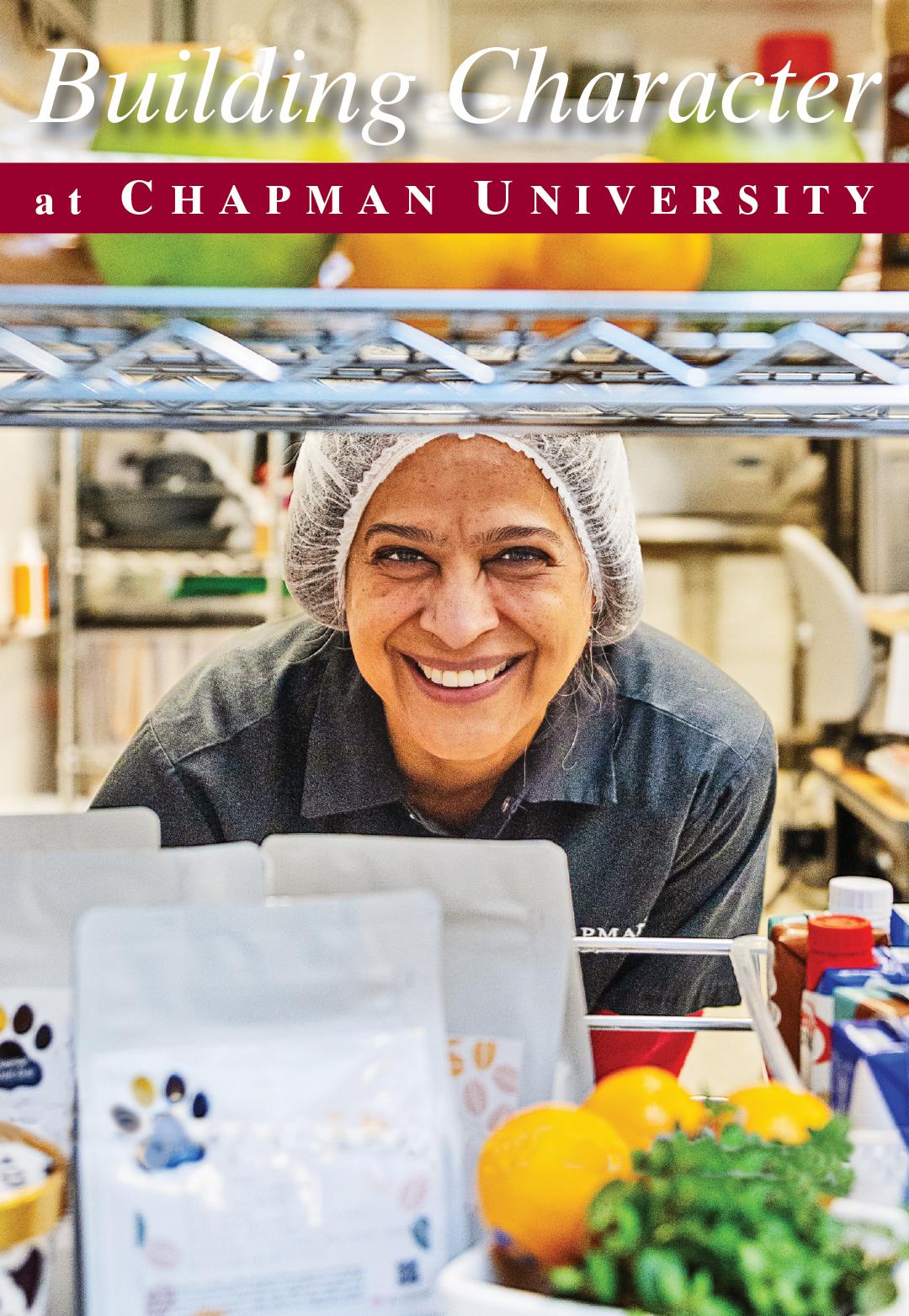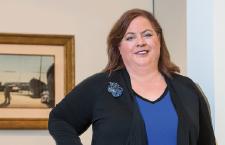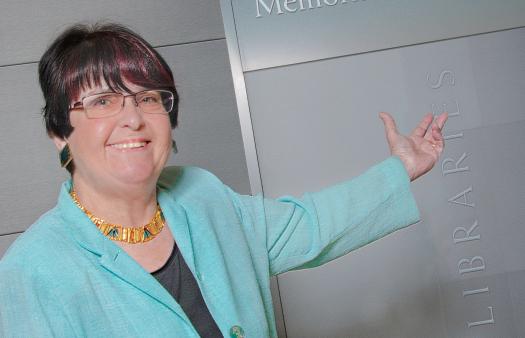
Anuradha Prakash, PhD
As a child growing up in Mumbai, India, Anuradha Prakash spent hours in the kitchen experimenting. “I was fascinated with food and loved cooking and playing with recipes,” says the Professor of Food Science at Chapman University. One summer break during high school, she made and sold par-baked pizza to local theaters at a time when pizza was just becoming popular in India.
Though Prakash wanted to be a chef, her parents encouraged her to pursue a science-based career. She was accepted at Ohio State University to study nutrition, but soon discovered the career wasn’t for her.
“I was 10,000 miles from home and had made a huge mistake,” recalls Prakash. “In tears, I went to my advisor, who suggested I visit the Food Science and Technology center, a field of study I didn’t even know existed. I was accepted into the program and flourished.”
Food Science involves the transformation that occurs when food is converted from raw materials into edible products. The discipline applies to everything done to prepare food for consumption, whereas nutrition is what happens to food once you consume it. “What we do as food scientists affects people’s health and wellbeing, and there is lot of responsibility involved,” says Prakash. “Food Science ensures food is wholesome, delicious, nutritious and safe.”
After earning a Master of Science and PhD in Food Science from Ohio State University, Prakash took a post-doctoral opportunity at Natick Labs in Massachusetts where she worked from 1991-1995. Natick produces MREs (Meals Ready-to-Eat) for the U.S. Armed Forces.
“At Natick, I worked on improving the flavor and texture of freeze-dried scrambled eggs using novel processes,” she says. “Natick pioneered many technologies we teach in our classes today, including developing meals eaten by astronauts while in space.”
Discovering Teaching and Joining Chapman
Prakash originally intended to work in the commercial Food Science industry, but before leaving Natick was invited to teach a Food Engineering course at Framingham State University and discovered she really enjoyed teaching. When a position as Assistant Professor of Food Science at Chapman University opened, she applied and was accepted, joining the faculty in 1995.
Prakash has taught Food Processing and Food Product Development during her time at Chapman and was instrumental in developing the Food Science Program, serving as Director from 2001-2022. Her USDA-funded research, which she began in the late 1990s, focuses on using irradiation to enhance the safety and shelf life of fresh and fresh-cut fruits and vegetables and ready-to-eat meals.
“There were some major foodborne outbreaks in the late 1990s, including in fresh spinach and ground meat, so there was interest in radiation to make food safe, and more recently, to use it as a non-chemical alternative to control spread of destructive pests like the Mediterranean Fruit Fly,” says Prakash, who also served as Science Advisor to the FDA Pacific Regional Lab-Southwest and Associate Editor for Radiation Physics and Chemistry.
In 2018, Prakash’s opportunities for research and teaching applied principles accelerated with the opening of Chapman’s Keck Center for Science and Engineering. “I designed the Food Science Innovation Lab with the intent of obtaining the best equipment possible that we could use for teaching and also allow for working on industry projects,” she says.
The result was the state-of-the-art Ranney Food Processing Laboratory where students practice unit operations used in food processing and also perform small-scale trials for food companies. “Working in the lab on real-world projects is a great experience for the students,” says Prakash, who notes they’ve done an eclectic mix of projects, including pasteurization of beverages such as kombucha and plant-based milk alternatives and creating freeze-dried, cold-brewed coffee.
Growing Pains
Building Chapman’s Food Science Program hasn’t been easy. “We have struggled with small staff and budget cuts,” says Prakash of the program that today has six full-time faculty and includes a Master of Science in Food Science and combined Master of Science in Food Science/Master of Business Administration.
Chapman University President Daniele Struppa became acquainted with Prakash when he was Provost. “When Anu and I met, I told her I wanted to close her program,” says Struppa. “It says a lot about her emotional intelligence that she convinced me not to, and that we ended up becoming good friends. She could have responded in a despondent and vitriolic way, but instead she said she understood my reasons and asked for the opportunity to discuss how she could keep the program open. She had some very intelligent ideas and was willing to cooperate with me to help achieve my goals for the institution.
“I’m very proud of what she has done with the Food Science program,” continues Struppa. “She has an infectious energy and rare entrepreneurial mindset and is a model for younger students on how to be effective members of the university. She also served with great distinction on the Faculty Senate, and played a central role in advising me on many issues as we moved the university into a more science-oriented direction.”
Colleague Lilian Were Senger, PhD, Professor, Program Director for the Faculty of Food Science adds, “Dr. Prakash has been invaluable in making the Food Science program distinguished globally. It is through her efforts that we now have an MBA/Food Science degree, which is a tremendous benefit to the food industry community as we prepare students with both a technical and business background. Her out-of-class activities and food industry projects provide students with opportunities to connect and work within the industry on real-world problems.”
Learning from Students
For Prakash, interactions with students are especially fulfilling. “Instructors are tasked with equipping students to do their best. Seeing their transformation as they progress in their academic careers and enter the working world is really rewarding. At some point, you come to realize they know more than you, and that brings wonderful opportunities to learn from them.”
Chapman alumnus Sabrina Wildermuth met Prakash in 2009 when she was a freshman undergraduate in graphic design and took an introductory Food Science and Nutrition course, becoming fascinated with the field.
“Dr. Prakash became a guiding light when I decided to minor in food science as an undergraduate,” says Wildermuth, who earned her undergraduate degree in 2012 and a Master’s in Food Science in 2015 and is now QA Nutrition & Regulatory Senior Manager at Thrive Market. “She came up with the ingenuous idea to combine my food science/nutrition learning with my nutrition marketing internship at Sodexo at the University’s cafeteria where I also cooked and baked in the kitchen for the various stations and meal options. At her suggestion, I learned the nutrition software, ESHA Genesis, and using my graphic design background created an at-a-glance traffic light nutrition labeling system using the nutrition information I’d analyzed for many of the cafeteria’s recipes. The signs were permanently affixed to each station of the cafeteria. Dr. Prakash was proud of what we’d accomplished, so we pursued publishing the cafeteria nutrition labeling system and our research in the Journal of Foodservice Management & Education in 2012.”
For Wildermuth, Prakash’s mentorship profoundly affected her career. “Dr. Prakash is creative and ingenious in putting together networking events and training courses that bring together industry and students. I have her to thank for where my educational path led and what my career has become. We have stayed in touch throughout the years, not only as mentor and mentee, but also as friends.”
One way Prakash enjoys keeping in touch with current and former students is through the Chapman Coffee Club, which came about in 2021 when Prakash and students began getting together every Friday over coffee roasted and brewed at the lab to learn more about the invigorating beverage. Recently, they sold their coffee to the Chapman community as a fundraiser.
“I’m excited about the Coffee Club and greatly enjoy getting together with the students,” says Prakash. “I’ve had a wonderful career.” When asked for the recipe for her success, she shares that it has been a combination of ingredients she has plenty of—“curiosity, hard work, resilience and optimism.”



